IMMUNE RESPONSE
How immunologist Max Cooper may have saved your life
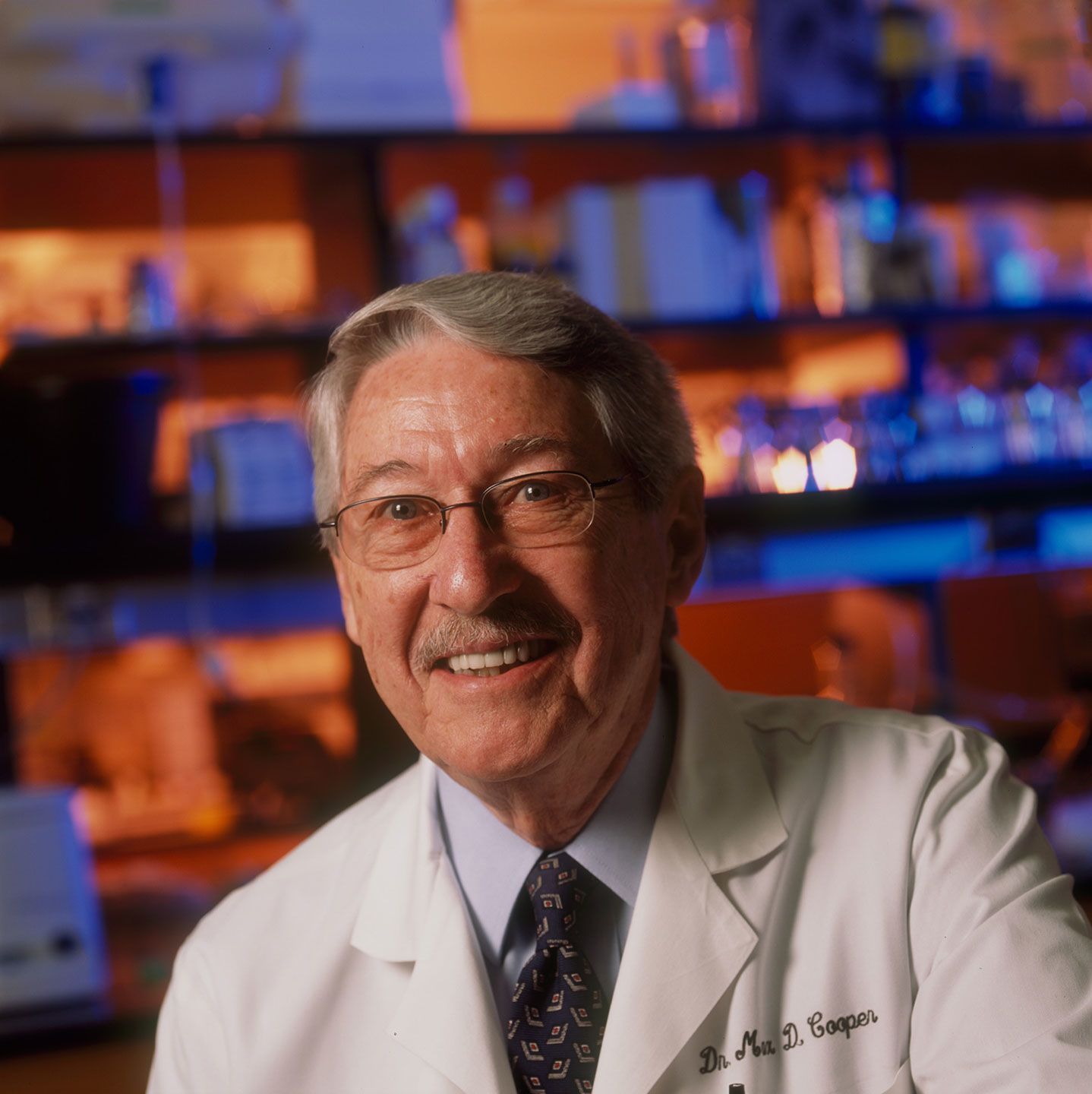
A half-century ago, Max Cooper made a historic discovery that forever changed our understanding of the human immune system.
His breakthrough that the body has two separate kinds of lymphocytes, or white blood cells, to defend itself opened the door to a new world of treatments and vaccines.
Now the Emory immunologist is being honored with a Lasker Award, America’s most prestigious biomedical research award, for his joint work on the discovery that has helped save countless lives.

A half-century ago, Max Cooper made a historic discovery that forever changed our understanding of the human immune system.
His breakthrough that the body has two separate kinds of lymphocytes, or white blood cells, to defend itself opened the door to a new world of treatments and vaccines.
Now the Emory immunologist is being honored with a Lasker Award, America’s most prestigious biomedical research award, for his joint work on the discovery that has helped save countless lives.

The Lasker Foundation announced Sept. 10 that Cooper is a recipient of the 2019 Albert Lasker Basic Medical Research Award. He is professor of pathology and laboratory medicine at Emory University School of Medicine, a member of the Emory Vaccine Center, and a Georgia Research Alliance Eminent Scholar. He is honored along with Jacques Miller from the Walter and Eliza Hall Institute of Medical Research.
Cooper and Miller are recognized for identifying and defining the function of B and T cells, a monumental achievement that uncovered the organizing principle of the adaptive immune system and launched the course of modern immunology.
“Max Cooper’s pioneering research and ongoing work have influenced countless other discoveries in science and medicine and have impacted decades of incredible progress in preventing and treating disease.”
“We are extremely fortunate to have him as a member of our Emory University and Vaccine Center faculty," says Lewin, Emory executive vice president for health affairs and executive director of the Woodruff Health Sciences Center.
The adaptive immune system, which comprises B and T cells, “remembers” specific invader organisms (known as pathogens) or other abnormal cells in the body that it has encountered, and eliminates them.
B cells develop in the bone marrow and produce antibodies in response to pathogens, disabling them or tagging them to be destroyed. T cells mature in the thymus gland and help alert B cells to the presence of pathogens; they can also detect and kill infected or abnormal cells.
Miller showed that the thymus, previously thought to be a vestigial organ, is essential for immune function. Cooper then demonstrated that there are two distinct cell lineages in the adaptive immune system: B cells and T cells.
Working with chickens, he showed that an avian organ called the bursa of Fabricius is the site where B cells mature, and he characterized the different stages of B cell development. Miller established that interactions between B and T cells are essential to their normal maturation and functions. Later, Cooper and colleagues showed that, in mammals, B cells are generated in the liver of the fetus and in the bone marrow after birth.
These seminal discoveries defined the field of adaptive immunity and serve as the building blocks for current immunology research and clinical advances.
“Max’s contributions to the field of immunology are enormous and transformative,” says Rafi Ahmed, PhD, director of the Emory Vaccine Center and a Georgia Research Alliance Eminent Scholar. “He continues to conduct groundbreaking research that is shaping current science and the future of medicine.”
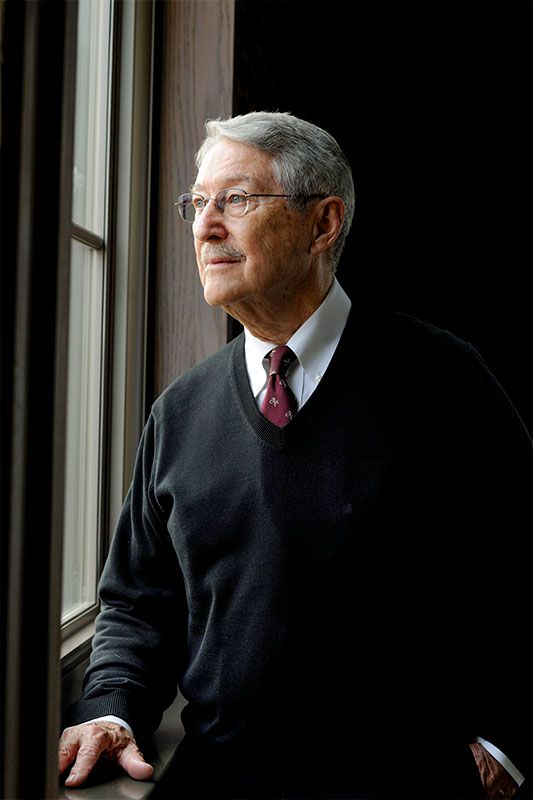
"I cannot imagine a field of research that is more exciting or one that offers better opportunity to explore the balance of life on our planet. Perhaps this view explains why I am hooked for life with immunobiology." — Max Cooper
Discoveries that change lives
Cooper is a member of the Emory Center for AIDS Research and the Emory Winship Cancer Institute, professor in the Department of Pathology and Laboratory Medicine, and a former president of the American Association of Immunologists and of the Clinical Immunology Society.
He is a member of the National Academy of Sciences, the National Academy of Medicine and the American Academy of Arts and Sciences. In 2017, he was elected to the Académie des Sciences of the Institut de France and to the Royal Society of London.
His landmark discoveries provided a framework for understanding how white blood cells normally combat infection — and how they can undergo abnormal development to cause immune deficiencies, leukemia, lymphomas and autoimmune diseases. Cooper’s work also contributed to the medical knowledge that enabled transplants of bone marrow stem cells to treat blood cell cancers.
In 2018 he was awarded the Japan Prize, which recognizes individuals who are pioneers in their fields and whose original and outstanding achievements not only contribute to the advancement of science and technology, but also promote peace and prosperity for all mankind.
“We are tremendously proud of Dr. Cooper and this outstanding and well-deserved recognition of his lifelong work,” says Vikas P. Sukhatme, MD, ScD, dean of Emory University School of Medicine. “His seminal discoveries have been essential to the advancement of the field of immunology and its life-changing results — basic science enabling clinical advances across a broad spectrum of diseases at the very highest level.”
Cooper’s honors include the Founder’s Award of the Society for Experimental Biology and Medicine (1966), Sandoz Prize in Immunology (1990), American College of Physicians Science Award (1994), AAI Lifetime Achievement Award (2000), AAI-Dana Foundation Award in Human Immunology Research (2006), Avery-Landsteiner Prize (2008) and the Robert Koch Prize (2010).
The Lasker Awards are America’s most prestigious biomedical research awards, and for the past 74 years have recognized the contributions of leaders who made major advances in the understanding, diagnosis, treatment, cure or prevention of human diseases. Recipients of the Lasker Medical Research Awards are selected by a distinguished international jury.
Established in 1942 by Albert and Mary Lasker, the Lasker Foundation is committed to inspiring robust and sustained support for biomedical research. More details on the Lasker Award recipients, the full citations for each award category, video interviews and photos of the awardees, and additional information is available through the Lasker Foundation website.
Emory media contact: Vincent J. Dollard, associate vice president for communications, Woodruff Health Sciences Center, 404-727-3366, vdollar@emory.edu
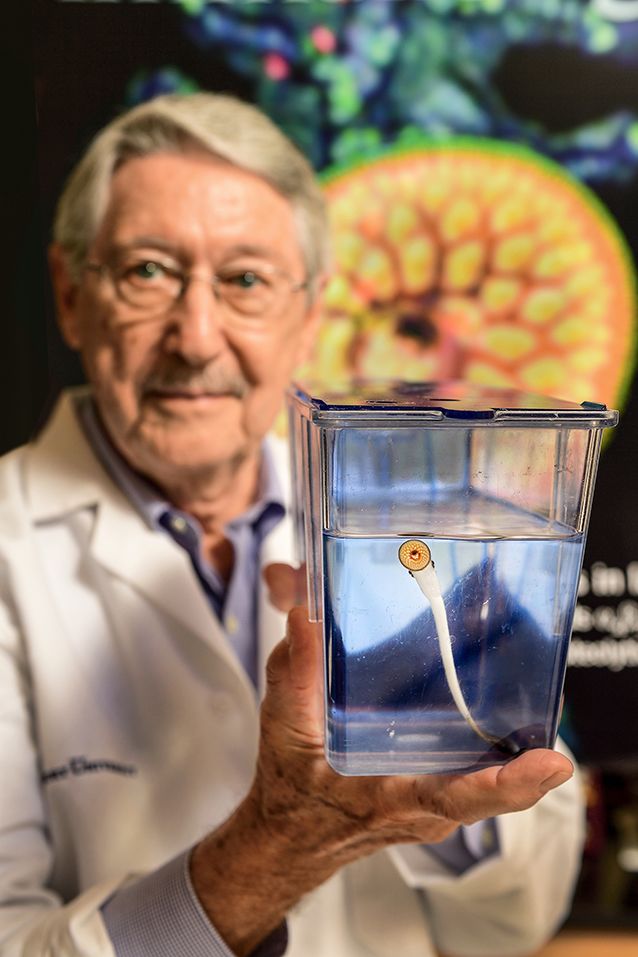
Max Cooper, a Georgia Research Alliance Eminent Scholar, is researching the lamprey’s unique immune system, which separated from our own about 500 million years ago. Here he holds a juvenile lamprey.
Max Cooper, a Georgia Research Alliance Eminent Scholar, is researching the lamprey’s unique immune system, which separated from our own about 500 million years ago. Here he holds a juvenile lamprey.
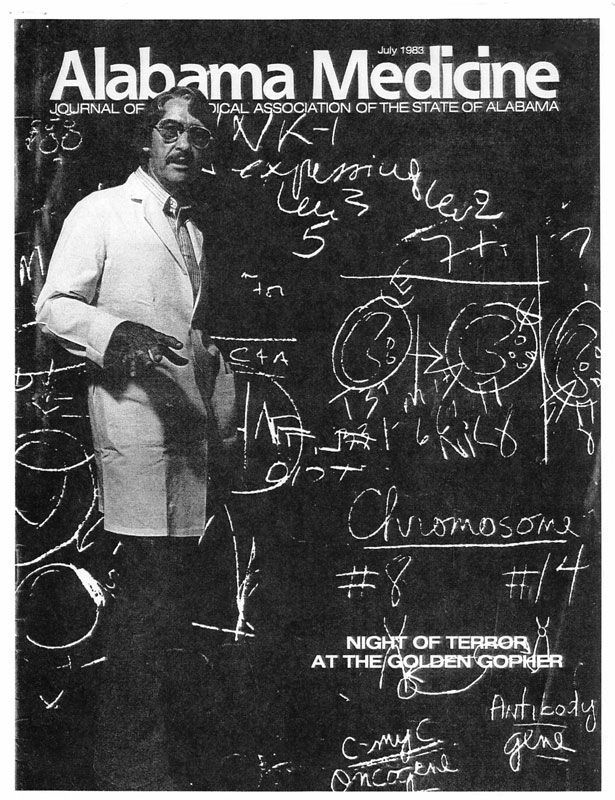
Max Cooper appeared on the cover of the July 1983 issue of the Journal of the Medical Association of the State of Alabama. Cooper spent four decades at the University of Alabama before joining Emory in 2008.
Max Cooper appeared on the cover of the July 1983 issue of the Journal of the Medical Association of the State of Alabama. Cooper spent four decades at the University of Alabama before joining Emory in 2008.

"I cannot imagine a field of research that is more exciting or one that offers better opportunity to explore the balance of life on our planet. Perhaps this view explains why I am hooked for life with immunobiology." — Max Cooper
"I cannot imagine a field of research that is more exciting or one that offers better opportunity to explore the balance of life on our planet. Perhaps this view explains why I am hooked for life with immunobiology." — Max Cooper
Video: Learn why Emory professor Max Cooper is considered one of the most influential immunologists in the world.

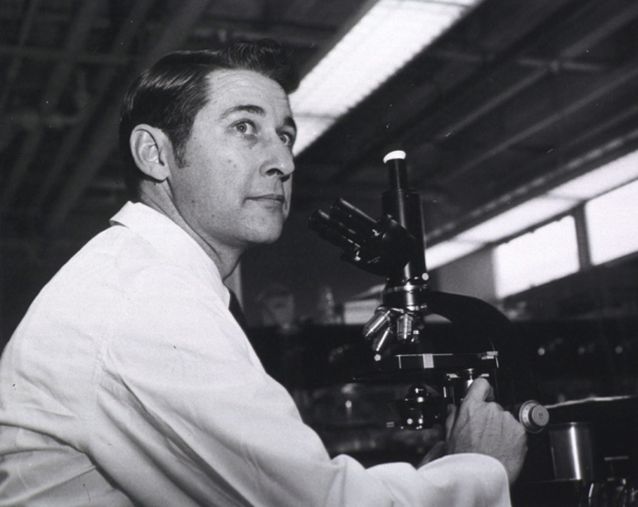
Max Cooper discovered B-cell and T-cell systems in the 1960s, laying the groundwork for modern immunology.
“One of the most remarkable things about a career in biomedical research is that you can start almost anywhere and end up in the most unforeseen places, being constantly amazed by what you are learning along the way.” — Max Cooper
Max Cooper: On becoming a physician scientist
Little did I imagine while growing up in rural Mississippi in the 1930s that I would eventually pursue a research career in immunology. My childhood was rich in unfettered time, space to roam freely, woods and streams to explore, an uncontaminated view of starry night skies to ponder, and an abundance of books to read. The treasure of books and the thirst to read them were gifts of my father, a mathematician and educator, and my mother, also a teacher. We lived on the campus of the 12-grade school where my father was the superintendent.
The tranquility of life was abruptly altered in 1941 by U.S. entry into World War II. Older boys in the community were drafted into the military services, my mother began to work in an underground munitions plant, and, in 1945, my older brother joined the Marines at age 17, just before peace was declared.
As a high school senior obsessed with sports, hunting, and girls, I began to realize that reaching my stated goal of becoming a doctor would require a great zeal for study and a long time in school at a high cost.
The tragic death of my wonderful and adventurous older brother in an automobile accident abruptly changed this equation for me. He had made me the beneficiary of his service insurance policy.
During this time of intense family grieving, my father took me aside to tell me that I now must do what my brother and I both would have done. Although my interests did not change overnight and my study habits failed to undergo any miraculous transformation, I began the well-prescribed course to becoming a doctor.
My fascination with caring for patients and understanding the pathophysiology of their diseases grew at each step along this career path. It became more and more obvious that I had stumbled into an endless wonderland of challenging problems.
This is an excerpt from an essay by Max Cooper that first ran in the Annual Review of Immunology.

Max Cooper discovered B-cell and T-cell systems in the 1960s, laying the groundwork for modern immunology.
Max Cooper discovered B-cell and T-cell systems in the 1960s, laying the groundwork for modern immunology.



